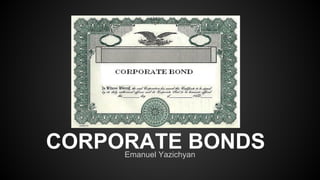
CORPORATE BONDS-2
- 2. What are corporate bonds? ● A corporate bond is an investment instrument strategy used by businesses when they need to raise money for growth and expansion. ● A bond is a security issued by a company to an investor. The company repays this investment with a fixed interest rate over a pre-planned period of time. Source: www.investinganswers.com
- 3. How corporate bonds work: 1. A company decides they want to expand, but need financing for the necessary resources 2. They begin to establish themselves with investment corporations, since this is where investors view the different bonds available along with the company's details and records, like a catalogue. SOURCE: www.investopedia.com
- 4. Continued: ● If bonds are chosen, the Par Value is paid by the investor ● A par value is listed price of the bond ● A Corporate bond often costs around $1000 and is bought in $5,000 denominations ● These transactions are most commonly done through investment companies like Fidelity and Dow Jones Source: www.Forbes.com
- 5. Continued: ● The issuers repay the face value with a 1-4% interest rate to the investors. ● These payments are compounded annually or semi-annually toward the maturation date ● A maturation date is the date at which the principal will be fully repaid SOURCE: www.financialdictionary.com
- 6. What makes them different from other investments? ● Businesses offering corporate bonds MUST repay their investors at a fixed annual or semi-annual rate, like a credit contract. ● The collective payment consists of a principal and interest rate on top. SOURCE: www.investorwords.com
- 7. Continued ● Unlike stocks, amount repaid stays the same regardless of companies growth or liquidity ● Therefore, investors have a more stable investment ● Also, there’s Current Yield- where if the price of a bond decreases, the interest rate owed to the investors increases. www.investopedia.com
- 8. Process of Buying Corporate Bonds ● Investors and average citizens have to choose a brokerage firm with which to deal ● Brokerage firms include: E-trade, Vanguard, etc. ● Must review selection of bonds offered by brokerage firms and choose what one wants ● Can be done with assistance of professional investment forecasters or etc SOURCE: Investopedia.com
- 9. Continued: ● Minimum investment usually five thousand dollars ● Bonds are often issued and sold in one thousand dollar denominations ● Have to buy several bonds from company, not individual SOURCE: Investopedia.com
- 10. Rate of return ● the rate of return is annually or semi-annually over a one- year period until the bond’s maturation date. ● Bonds for private companies or ones issued from the U.S. Treasury with an interest rate of one through four percent and anywhere in between. SOURCE: Investopedia.com
- 11. continued… ● Yield is the amount of money repaid on the initial investment at the end of one year. ● There are no dividends involved and the amount received is the combination of interests and principal paid annually or semi-annually to the investors until the bond matures. SOURCE: Investopedia.com
- 12. continued... ● Unlike stocks, corporate bonds come with a guarantee of a stable repayment and interest rate that stays the same for the investor regardless of the company's fluctuating net worth or financial position SOURCE: Investopedia.com
- 13. Liquidity ● corporate bonds’ liquidity is usually more liquid than other bonds but in the UK and US there have been articles stating that liquidity of corporate bonds is lower ● shows that many new investments cannot be bought or sold quickly enough to prevent or minimize a loss. SOURCE: investopedia.com
- 14. Restrictions ● must repay bond within year ● you have to repay the owner in stable amounts consistently regardless of financial position. pay the fee for the investment prior to the rent or food, etc. ● total minimum investment: five thousand dollars whether bought at once or through five one thousand dollar denominations Source: investopedia.com
- 15. Tax Implications ● interest received from corporate bonds is subject to federal and state income tax. ● can gain capital on corporate bond if able to sell for profit before maturation ● if sold up to year from purchase, gains are taxed at ordinary rate. SOURCE: Investopedia.com
- 16. continued... ● sold more than year from purchase, long-term capital gains taxed at max. rate: 15% ● If sold for less than what you paid, you can incur a capital loss. ● If losses exceed gains, can deduct up to $3,000.00 of net capital losses annually from your income Source: investopedia.com
- 17. continued.. ● any capital losses exceeding three thousand dollars are carried forward and can be used in the future. SOURCE: investopedia.com
- 18. Risk ● Risk is varied ● Secured vs. Unsecured bond ● Secured: not generally risky ● expecting to claim from company after it’s unable to pay the annual/semi-annual fee. ● Unsecured: no guarantee that you will get your money back, based on trust/luck SOURCE: investopedia.com
- 19. Example
- 20. Our Opinion! ● corporate bonds more stable and sufficient ● emphasis on secured corporate bonds ● Waiting due to low levels of liquidity, we will wait and see SOURCE: our minds
- 21. Corporate Bonds! Source: google images